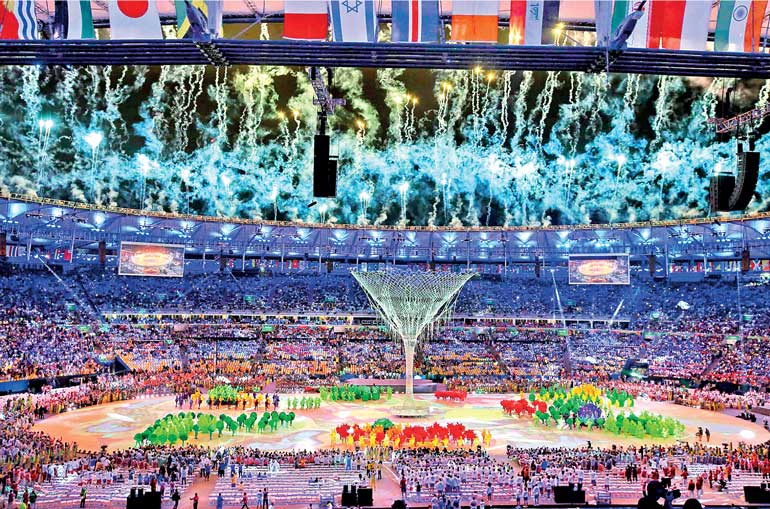Tuesday Feb 17, 2026
Tuesday Feb 17, 2026
Wednesday, 24 August 2016 00:01 - - {{hitsCtrl.values.hits}}
 Performers take part in the Rio Olympics closing ceremony. REUTERS
Performers take part in the Rio Olympics closing ceremony. REUTERS
Reuters: In the end, it was a tale of two Games. The yin and yang Olympics, one of stark contrasts between the feats on the field of play, and regrettable actions off it.
Staged despite a lack of funds, deep recession and social turmoil, Rio de Janeiro unfurled South America’s first Olympic Games hoping against hope that the power of sport would eclipse a seemingly endless list of problems.
Arguably, it did.
Try telling one of the 80,000 Brazilians crammed into the Maracana stadium, who roared deliriously as Neymar won Brazil football gold with a crisp last-kick penalty, that this Olympics was anything but a success.
Or the residents of a notorious Rio slum who watched one of their own win Brazil’s first gold, in the judo arena.
Or try telling any one of the nine athletes who clinched their country’s first Olympic golds, or Team GB who finished second in the medal table with their best performance in more than a century with golds across an unrivalled 15 sports.
Some felt Rio failed to present the five-star experience tourists and visitors had enjoyed at London 2012, but the Games proved the city could deliver a spectacle against the odds.
“Nothing big wrong went wrong, right?” was a verdict repeated time and time again by smiling locals.
Swampy green diving pool
A swampy green diving pool and a bullet whizzing into the equestrian centre were of no consequence to most locals.
Rio 2016 had struggled with transportation, security, empty stands and dwindling funds as Brazil was gripped by its worst economic downturn since the 1930s.
For weeks, they suffered blow after blow. They were accused of cutting corners and the Australians threatened not to move into the athletes’ village unless urgent improvements were made.
Ryan Lochte and the other three U.S. swimmers hijacked media coverage for the second half of the Games by lying about being robbed at gunpoint to cover up for a drunken night.
And then there was the arrest of 71-year-old International Olympic Committee (IOC) member Pat Hickey in a dawn raid, as part of a Brazilian police investigation into ticket touting.
But for the thousands of visitors and locals who embraced the Games, flowing each morning over an elevated walkway into the Olympic Park, this had been a resounding success.
“Even with all our problems we pulled off a good Olympics. Nothing too bad happened and I’d say it was better than expected,” said Nivea Araujo, a Rio resident attending the closing ceremony.
Certainly there were many highs.
In the pool, Michael Phelps swam into retirement, the U.S. great adding five golds to a tally that now stands at 23, among a total of 28 medals. He bowed out with one last 4x100m relay victory that brought tears to his eyes.
Phelps savoured his 200m butterfly gold, winning back the title he had lost to South African Chad Le Clos in London, as well as victory in the 200m individual medley which made him the first swimmer to win the same event at four successive Games.
But he was also beatable, as Singapore’s Joseph Schooling showed in touching out the legend who had inspired him with a historic victory in the 100m butterfly. Phelps finished in a three-way tie for silver.
Gold milestones
Among the women, Katie Ledecky enhanced her formidable reputation, winning three individual gold medals in freestyle events, and five medals in all. Hungary’s Katina Hosszu finally achieved some Olympic alchemy, converting a lifetime in the training pool into three individual golds.
Schooling’s gold was Singapore’s first and he returned home a hero. Crowds cheered him as he arrived at Changi airport.
Eight other nations earned their first Olympic gold medal: Bahrain in the women’s steeplechase, Fiji in the men’s Rugby Sevens, Ivory Coast and Jordan in the men’s taekwondo, Kosovo in women’s judo, Puerto Rico in women’s tennis, Tajikistan in men’s hammer-throwing and Vietnam in men’s shooting.
Andy Murray also wrote some history, becoming the first tennis player to defend Olympic gold in singles.
American gymnast Simone Biles was the breakout star of Rio, winning a record-equalling four golds for a female gymnast at a single Games. On the men’s side, KoheiUchimura lived up to his ‘Supermura’ moniker by guiding Japan to team gold and then becoming the first gymnast in 44 years to win back-to back Olympic all-around titles.
The athletics programme produced three world records, including stunning runs in the 400m by South Africa’s Wayde van Niekerk and women’s 10,000m by Almaz Ayana that both erased marks set last century.
Elaine Thompson pulled off a brilliant 100m-200m double as Jamaica again dominated the sprints, while Briton Mo Farah became the second man to retain the 10,000m and 5,000m titles.
But one man bestrode the whole event, Usain Bolt signing off his extraordinary Olympic career with an unprecedented treble-treble: gold in the 100m, 200m and 4x100m relay for the third time in successive Games.
“Relief. I’ve had all this pressure over the years... I will definitely miss the sport, miss the Olympics because it’s the biggest stage,” the charismatic Jamaican said.
“I’ve accomplished what I wanted to in track and field. I just have to make new goals and a new bucket list but first I just want to go on vacation and relax.”
Amen to that. The city might well agree.